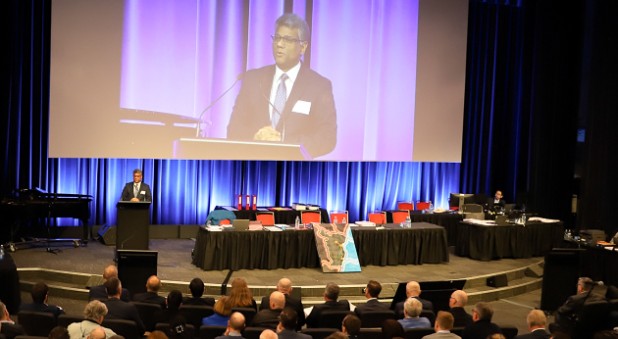"I am bringing before the Synod a statement of purpose and priorities for the diocesan fellowship," said Archbishop Raffel as he opened the Sydney Synod for 2023. Archbishop Raffel has often expressed that he prefers the term 'fellowship of churches' to the word diocese, and included schools and organisations as part of the wider mission.
He told Synod that his statement "is not intended to be a mission statement for your church. Nor is it intended to be a mission statement for the organisations all of which have their own specific ministry purposes. But it recognises that the disciple making purpose of the churches may also be served by the organisations and schools that under God, are part of our diocesan fellowship. I want to invite us to think creatively and intentionally about how as a diocesan fellowship of churches, organisations and schools we may collaborate in the broader purpose that we share – the enduring Christian purpose of making disciples until the end of the age."
In a wide-ranging speech taking in church networks, organisations and institutions, the Archbishop said that "under God we seek to see God multiply believers in Christ, multiply churches and multiply workers for the harvest field." This, he said, was a work of God. "We need the work of God in us, so that we long for the welfare of our neighbours and friends and fellow Sydneysiders with the longing of Jesus who wept over Jerusalem, though it was hardened against him."
One of the centrepieces of the address was a call for what Archbishop Raffel called a more intentional commitment to communication, collaboration and coordination. "Talking together, working together and planning together," he said. "Can we cultivate instincts of communication, collaboration and coordination? I believe that it is urgent that we do so. Few people have any reason to visit a church, and the vast majority of people in Sydney have no real likelihood of encountering the gospel of the Lord Jesus in the ordinary course of events. Collaborative effort can multiply the opportunities for people to develop friendships with Christians or encounter the gospel message. "
The context of mission
"The context of our mission is no less needy than it was at the beginning but at least in some places, it is arguably less open. Amongst other things, the widening gap between the individualism of the wider culture and the biblical ethics of humanity put us at odds with the dominant culture’s primary virtue of autonomous self-expression. However, this is hardly new. "
First Nations ministry
The Archbishop said Indigenous leadership and ministry is a priority for our diocesan fellowship. "The Synod will consider the request of the Sydney Anglican Indigenous Peoples Ministry Committee to appoint a committee to report on how to strengthen the leadership of Indigenous ministry in the Diocese. Sydney has the largest urban population of First Nations peoples in the country and we are grateful to have four indigenous-led ministries, including three churches. But there are numerous challenges including that some of the elders of the Indigenous Christian community, many of whom have served faithfully with very little support for many years, are now reaching an age where they cannot be expected to continue to shoulder the greater part of the work, and yet we have few in the wings and no pathway which accounts for the demands and the obstacles faced by Indigenous brothers and sisters who seek to serve the Lord in pastoral ministry. I hope the Synod will warmly welcome the conversation about the best way to support Indigenous ministry into the future including the creation of significant leadership roles."
Churchplanting and Greenfields
The final part of the Archbishop's address dealt with the decisions made at last year's Synod in the Greenfields.
"Last year, the Synod agreed to three significant property proposals relating to our commitment to plant churches in Sydney’s expanding Greenfields areas," the Archbishop said. "First, that the Land Acquisition Levy should continue for another ten years. This has allowed the Anglican Church Growth Corporation to progress property acquisition opportunities in a timely way. In the last year properties at Box Hill and Catherine Fields have been acquired. This is a great answer to prayer and a direct outcome of the synod’s decision to partner in this way. Second, that we should seek to develop a diocesan-wide ministry-directed property-strategy so as to harness our property assets to ensure that we are able to provide Anglican ministry in greenfields areas, and third, that under certain circumstances, where there are property assets surplus to the needs of local ministry they may with the agreement of the parish be held in trust for the wider purposes of the diocese."
Sydney in 30 years
The Archbishop said the way ahead would need a far-reaching vision."The time frames in which we are speaking necessarily mean that we are casting our minds and our prayers to times and ministry needs and opportunities that we may never see ourselves. Certainly, almost none of us in this Synod who make these decisions will be the decision makers in thirty years time. In considering the draft property strategy for the South West, in anticipation that we will undertake similar work for the whole diocese, we are faced with the challenge of making provision for the ministry of Sydney Anglicans three decades from now. If we cast our minds back three decades, that takes us just to 1993. I was in second year at Moore College. I’d been a Christian for 7 years. I would not have anticipated that I would be making this speech, and we cannot anticipate what ministry will be like at that time. But we can commit ourselves to being a disciple making church, that seeks to proclaim Christ as Lord and ourselves as servants of others for his sake."
Text of the Presidential Address is also available as a PDF download. Click here.






















